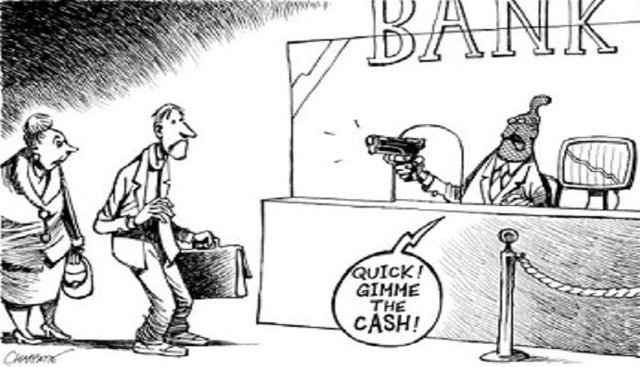Bail in coming to Singapore Soon.
Bank Bail-In

Singapore is going to have its own Bank bail in regime as the bill had been passed on 4th July 2017. The Singapore government has also identified the "Too Big Too Fail" Banks of Singapore and these banks are DBS, OCBC, UOB, Citi Bank, Standard Chartered, Maybank and HSBC. Out of these 7 banks I hope many of our steemian can identified which 3 banks is the most unsafe to keep your money in. I think soon it will be time for Singaporean to buy their own safe and start to slowly withdraw their 💰 and put it in their own safe or better still buy some precious metal like gold or silver to protect their purchasing power.
Below I'm going to share 2 news clips from my office daily read about the new bail in regime.
Article 1

SINGAPORE — In a move that will boost the stability of the financial system, Parliament on Tuesday (July 4) passed the Monetary Authority of Singapore (Amendment) Bill 2017, which strengthens the powers of the regulator to resolve distressed financial institutions (FI), among other legislative changes.
“Our methods have been broadly effective, as Singapore has withstood tumultuous episodes such as the Asian Financial Crisis of 1997 and the Global Financial Crisis of 2008… Notwithstanding, we need to update our laws and regulations that deal with resolution, so as to ensure effective handling of a financial institution that gets into serious trouble, and especially to avoid contagion or a loss of confidence in the system,” said Mr Ong Ye Kung, Minister for Education (Higher Education and Skills) and Second Minister for Defence at the second reading of the Bill on Tuesday. He was speaking on behalf of Mr Tharman Shanmugaratnam, Deputy Prime Minister and Minister-in-charge of the MAS.
“Our entire supervisory system is geared to reduce the risk of an FI in Singapore failing, but it is not possible to rule out such an eventuality, especially as our financial system is closely integrated with the global financial system,” Mr Ong said.
The Bill, which was tabled in Parliament for first reading in May, followed two rounds of public consultation by MAS on the proposed enhancements to the resolution regime for FIs in 2015 and 2016. It introduces explicit powers for MAS to require FIs – such as banks, finance companies and insurance companies - to prepare recovery plans and submit such information to the authority for resolution planning. This is necessary because robust and credible recovery and resolution plans can reduce the risks that a distressed FI poses to the stability of the financial system, Mr Ong said.
“They help to ensure the continuity of critical functions and services to the economy, and allow distressed FIs to regain their financial strength, restructure, or exit from the market in an orderly manner. MAS will apply recovery and resolution planning requirements to FIs that are systemically important or that maintain critical functions in Singapore,” he added.
The Bill also introduces legal provisions for MAS to temporarily block counterparties’ rights to terminate contracts with an FI in resolution. These provisions are necessary to ensure orderly resolution of the FI, said Mr Ong. In addition, the Bill introduces a statutory bail-in regime to enable MAS to write down or convert an FI’s debt into equity. The bail-in tool can help recapitalise distressed FIs, and reduce the risk to depositors and reliance on public funds to “bail out” distressed FIs, he said.
A coordinated approach towards resolving FIs that operate in multiple jurisdictions is important for safeguarding financial stability across home and host jurisdictions. The Bill introduces a statutory framework for MAS to recognise resolution actions taken by a foreign resolution authority on FIs in Singapore, Mr Ong said. In the event of a resolution of an FI, the Bill introduces a compensation framework for creditors who are more adversely affected in a resolution than they would have been in a liquidation, he added.
The Bill also introduces other updates to MAS’ mission statement and amendments to achieve greater operational efficiencies. Among these is a new provision that explicitly states that MAS’ development objective of growing Singapore into an internationally competitive financial centre is subordinate to its supervisory objective of fostering financial stability. The MAS’ Currency Fund will also be merged with the other funds of the authority to allow it to streamline operations.
Article 2

THE Monetary Authority of Singapore (MAS) will hold more powers to resolve problems of distressed financial institutions in an orderly way.
Ong Ye Kung, Minister for Education (Higher Education and Skills) & Second Minister for Defence, presented the second reading of the MAS (Amendment) 2017 Bill in Parliament on Tuesday. The Bill has been passed.
Presenting the Bill on behalf of Tharman Shanmugaratnam, Deputy Prime Minister, Coordinating Minister for Economic and Social Policies, and Minister-in-charge of MAS, Mr Ong, who is also a member of the MAS board, said the update to Singapore's resolution laws is to ensure effective handling of a financial institution that gets into serious trouble, and especially to avoid contagion or a loss of confidence in the system.
"Our entire supervisory system is geared to reduce the risk of an FI (financial institution) in Singapore failing, but it is not possible to rule out such an eventuality, especially as our financial system is closely integrated with the global financial system," said Mr Ong.
MAS will now have financial institutions deemed systemically important - including banks colloquially known as those "too big to fail" - to prepare recovery plans and submit them for resolution planning. The "domestic systemically important banks" in Singapore are DBS Bank, OCBC Bank, UOB, Citibank, Standard Chartered, Maybank and HSBC. They process 90 per cent of the total volume of retail transactions here. MAS will also apply the recovery and resolution planning requirement to financial institutions with critical functions here.
To ensure orderly resolution of a troubled financial institution, MAS will now hold powers to temporarily block most counterparties' rights to terminate contracts with a financial institution undergoing resolution.
The Bill also allows MAS to write down or convert a financial institution's debt into equity via a statutory bail-in regime. Such a bail-in - meant to resuscitate an ailing financial institution by restructuring the debt held by the institution's bondholders - can help to recapitalise distressed financial institutions, and reduce both the risk to depositors and reliance on taxpayers to "bail out" such troubled financial firms. This will for now apply to locally incorporated banks and bank holding firms.
MAS will recognise resolution actions taken by a foreign regulator on financial institutions here, so long as such actions do not prejudice domestic financial stability, result in inequitable treatment of Singapore creditors and shareholders, run contrary to Singapore's national interest, or have material fiscal implications.
The central bank will also provide for compensation to creditors of troubled financial institutions who are more adversely affected in a resolution than they would have been in a liquidation, said Mr Ong. But this will apply only when MAS forces a transfer of business, or forces a restructuring of share capital or a bail-in. This compensation would also apply only when MAS recognises similar resolution actions from foreign regulators.
The compensation will be determined by a valuer appointed by the Minister-in-charge of MAS, and be paid out of a resolution fund. MAS will first provide a temporary loan to the resolution fund for its immediate operating needs. Withdrawals from the resolution fund will be recovered from the industry later. MAS will consult the industry on how to determine such levies.
The Bill will also include a new provision that explicitly states MAS's development objective of growing Singapore into an internationally competitive financial centre is subordinate to its supervisory objective of fostering financial stability, said Mr Ong. "This makes explicit in the Act, a principle that has in fact been observed by the MAS all along."
Thank you for posting - This information is good to Know...
Sad that most Singaporean wouldn't know how this bill is going to affect them when they collapse happen.
Thank you for sharing this! I'm from Singapore too. I try to read every word but unfortunately i can barely understand the meaning of them.. How will this bill change our life? Could you please explain it in simple English? Thank you so much! Upvoted and followed. <3
It means if the banks fail in Sg, they can take your deposit to save the bank 🤢 They will treat depositors as unsecured investor of the bank because you deposit $ with them.
i see... thanks for explaining! btw it's funny when you said "buy some precious metal like golf or silver to protect their purchasing power" lol so typical sg... oh does it mean that it's a good time to withdraw your money, wait for financial crisis, then buy property?
Yup take some money out and keep it in a safe. I wanted to say gold not "golf" haha must be a typo.